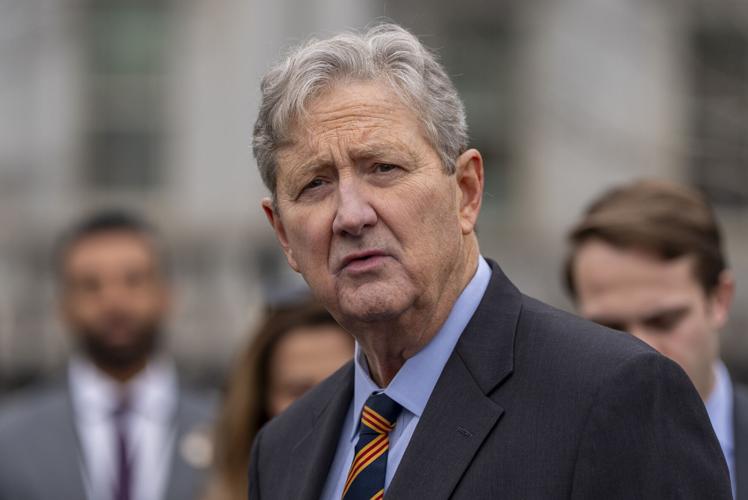In a fiery move that’s sending shockwaves through Washington, Louisiana Senator John Kennedy has introduced a new bill aimed at forcing lawmakers to share the pain of government shutdowns — by freezing their pay whenever federal workers go unpaid. The proposal, titled the “No Work, No Pay Act,” seeks to end what Kennedy calls “the double standard of privilege in Congress.”
The bill, introduced on the Senate floor this week, would automatically suspend congressional salaries during any government shutdown. Kennedy, known for his colorful rhetoric and populist tone, declared that lawmakers should “feel the consequences of their inaction just like every other federal worker.” His message was simple — if federal employees aren’t getting paid, neither should the politicians responsible for the gridlock.

“It’s time for members of Congress to walk a mile in the shoes of the people they represent,” Kennedy said in a statement. “If they can’t come together to do their jobs, they shouldn’t collect a paycheck.”
The timing of Kennedy’s legislation couldn’t be more explosive. With Washington once again teetering on the edge of a potential government shutdown, frustration among the public has reached a boiling point. Federal employees across the country have been bracing for delayed paychecks, while partisan battles over spending bills and border security continue to paralyze Capitol Hill.
Kennedy’s move has quickly become one of the most talked-about developments in the shutdown standoff — earning him praise from voters but drawing mixed reactions from fellow lawmakers. On social media, the announcement “exploded online,” trending across platforms as voters voiced both admiration and skepticism.
A Bold Political Gamble
Kennedy’s critics argue that the bill is more about optics than outcomes. Under current law, the Constitution prohibits Congress from altering its own pay midterm. That means Kennedy’s proposal, even if passed, could only take effect in future congressional sessions. Legal experts have already questioned whether the measure is largely symbolic — a political statement designed to resonate with frustrated voters rather than a legislative fix.
Still, symbolism can be powerful. Kennedy’s message taps into a populist undercurrent that has gained momentum across both parties: the perception that Washington’s political class is insulated from the consequences of its own dysfunction. “When the government shuts down, real people suffer,” Kennedy said. “It’s time the pain is shared equally.”
Even some Democrats have quietly acknowledged the bill’s emotional appeal. “It’s hard to argue against fairness,” one Senate aide told The Hill, though others dismissed the move as a “political stunt” ahead of the 2026 elections.
Public Reaction and Political Fallout
Online, reactions have been intense. Hashtags like #PayFreeze and #NoWorkNoPay surged within hours of Kennedy’s announcement. Federal employees flooded comment sections with support, saying the measure “finally gives lawmakers a taste of their own medicine.” Others pointed out that congressional salaries — roughly $174,000 per year — allow most members to weather shutdowns comfortably.
“Cutting off their pay might make them move faster,” one federal worker wrote on X (formerly Twitter). “We’ve been through this too many times while they argue on TV.”
Meanwhile, conservative pundits hailed Kennedy’s bill as a necessary wake-up call. “This is the kind of leadership Americans want — accountability,” said Fox News contributor Lisa Boothe. Progressive outlets, however, labeled the proposal “performative populism,” accusing Kennedy of seeking headlines rather than solutions.

Inside the Capitol Drama
Behind closed doors, sources say Kennedy’s bill has already stirred tension within Republican ranks. Some GOP lawmakers privately worry the measure could backfire, painting the party as fractured while negotiations with Democrats remain tense. “It’s a bold play,” one Republican strategist admitted. “He’s putting the heat on everyone — including his own leadership.”
Still, Kennedy appears undeterred. In an interview with Politico, he doubled down, saying, “If you can’t agree on a budget, maybe a little personal discomfort will help you find common ground.”
Insiders claim the senator has been fielding calls from both sides of the aisle — some supportive, others furious. One anonymous aide described the mood as “borderline mutiny,” adding that “nobody likes the idea of losing their paycheck, especially not in an election year.”
A Populist Playbook for 2025 and Beyond
Kennedy’s move fits squarely within a larger trend of anti-establishment populism reshaping American politics. As voters grow increasingly disillusioned with Washington gridlock, politicians who position themselves as outsiders willing to “shake up the system” are finding fertile ground.
Political analysts suggest that Kennedy — long considered a potential future candidate for national office — is carefully crafting a narrative that appeals to both frustrated conservatives and independent voters. His down-home humor and anti-elitist tone have made him a favorite among talk show audiences, and the “Pay Freeze” bill cements his image as a lawmaker unafraid to ruffle feathers.
Whether the legislation passes or not, it’s already succeeded in one thing: reigniting the debate over fairness and accountability in government.

The Takeaway
As Washington braces for another potential shutdown, Kennedy’s “No Work, No Pay” proposal has turned the spotlight back on Congress itself — a rare twist in the nation’s never-ending budget battles. Supporters see it as a long-overdue dose of justice; critics call it theater.
But in the court of public opinion, perception often matters more than policy. Kennedy has struck a chord — and in a town addicted to spin and spectacle, that alone is a victory.
For now, the senator is riding the wave of attention, confident that his message will resonate far beyond the marble halls of Capitol Hill. As he told reporters, “If this bill makes a few politicians uncomfortable, good. Maybe that’s exactly what Washington needs.”
The debate is far from over — and if Kennedy gets his way, the next government shutdown might come with a price tag Congress can’t afford to ignore.



